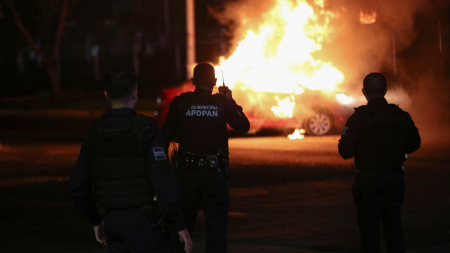The recent Immigration and Customs Enforcement (ICE) raids targeting undocumented immigrants in the United States have sparked a heated public debate, with celebrities, former government officials, and advocacy groups weighing in on the controversial issue. The raids, which commenced over the weekend, resulted in over 1,200 arrests and have been met with a mix of support and condemnation. Former ICE director Tom Homan staunchly defended the Trump administration’s actions, asserting that the agency makes “no apologies” for its enforcement efforts. He argued that ICE is primarily targeting illegal immigrants with criminal records and emphasized the importance of prioritizing public safety. Homan challenged those opposed to the raids to seek legislative changes through Congress rather than criticizing law enforcement agencies tasked with upholding existing immigration laws.
The debate surrounding the ICE raids intensified after singer Selena Gomez posted a since-deleted Instagram video expressing her emotional distress over the situation. In the video, Gomez lamented the perceived targeting of children and families, expressing a sense of helplessness and a desire to intervene. While her intentions appeared to be sympathetic, Gomez faced backlash for what some perceived as a superficial and out-of-touch response. Critics accused her of being performative and lacking a genuine understanding of the complexities of the immigration issue. Following the criticism, Gomez removed the video and subsequently posted a message on her Instagram story suggesting that expressing empathy for affected individuals was being met with disapproval.
Homan directly addressed Gomez’s video during a Fox News interview, refuting the claim that ICE is targeting families and reiterating the agency’s focus on individuals with criminal backgrounds. He emphasized that ICE operations are conducted in accordance with existing laws and contribute to the safety of American communities. Homan’s unwavering stance reflects the Trump administration’s commitment to stricter immigration enforcement, a central theme of the president’s political platform. This unwavering approach is anticipated to result in continued raids and potentially millions of deportations, further intensifying the ongoing debate about immigration policy in the United States.
While Homan claimed that families were not targeted in the raids, the impact on families and communities is undeniable. The separation of families, the fear and uncertainty experienced by undocumented individuals, and the disruption to community life are significant consequences of these enforcement actions. Advocacy groups and legal organizations have mobilized to challenge the legality and morality of the raids, raising concerns about due process, potential racial profiling, and the impact on vulnerable populations. The legal battles unfolding represent a clash between the administration’s emphasis on border security and the rights of immigrants, a conflict that will likely continue to play out in the courts.
The ICE raids also raise broader questions about the United States’ immigration system and the ongoing debate about comprehensive immigration reform. Critics argue that the current system is broken and that a more humane and effective approach is needed to address the complex challenges of undocumented immigration. They advocate for policies that provide pathways to legal status for eligible individuals, address the root causes of migration, and prioritize family unity. Proponents of stricter enforcement, on the other hand, emphasize the importance of border security and maintaining the rule of law, arguing that unchecked immigration undermines national security and strains social services. The deep divisions on this issue make reaching a legislative compromise challenging.
The public discourse surrounding the ICE raids highlights the polarizing nature of immigration in the United States. The emotional responses, the conflicting narratives, and the legal challenges reflect the deep societal divisions on this issue. While the Trump administration remains committed to its hardline approach, the debate over the human cost, the economic implications, and the legal ramifications of these enforcement actions will undoubtedly persist. The future of immigration policy in the United States hangs in the balance, shaped by the ongoing struggles between those advocating for stricter enforcement and those championing the rights and dignity of immigrants.










